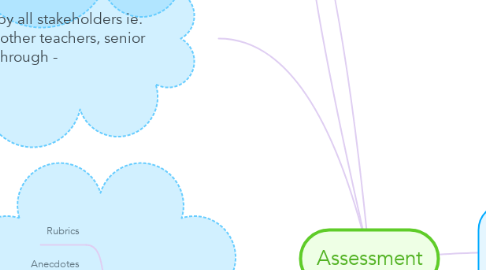Assessment
by Anita Chandrasekar


1. Kinds of assessment
1.1. Formative - ongoing, as well as taken as and when a new concept is covered.
1.1.1. A continuous check on understanding of concepts covered until then.
1.1.2. Informs the teacher as to where the child stands
1.1.3. Determines the next course of action based on the child’s performance
1.2. Summative - taken at the end of a unit
1.2.1. How far has the child understood the entire unit?
1.2.2. Modify/ retain learning engagements based on the outcome
1.2.3. In case of UOI, should LOIs/ CI be changed for next year
2. Goals of assessment
2.1. Enable the child to make connections with life in school, at home and the world around
2.2. Foster all 5 essential elements in a child - Knowledge, Skills, Concepts, Attitudes, Action
3. Tools
3.1. Rubrics
3.2. Anecdotes
3.3. Checklists
3.4. Continuums
3.5. Exemplars
4. Viewed by all stakeholders ie. parents, other teachers, senior leaders through -
4.1. SLCs
4.2. Reports
4.3. PYP exhibition
5. Effective assessments
5.1. Allows students to
5.1.1. share their learning
5.1.2. use various learning styles to express understanding
5.1.3. Reflect - self and peer-assmt
5.1.4. base learning on real-life experiences
5.2. Allows teachers to
5.2.1. plan
5.2.2. gather and provide evidence
5.2.3. review and reflect
5.3. Allows parents to
5.3.1. understand student's progress
5.3.2. see evidence of learning
5.3.3. support and celebrate learning
